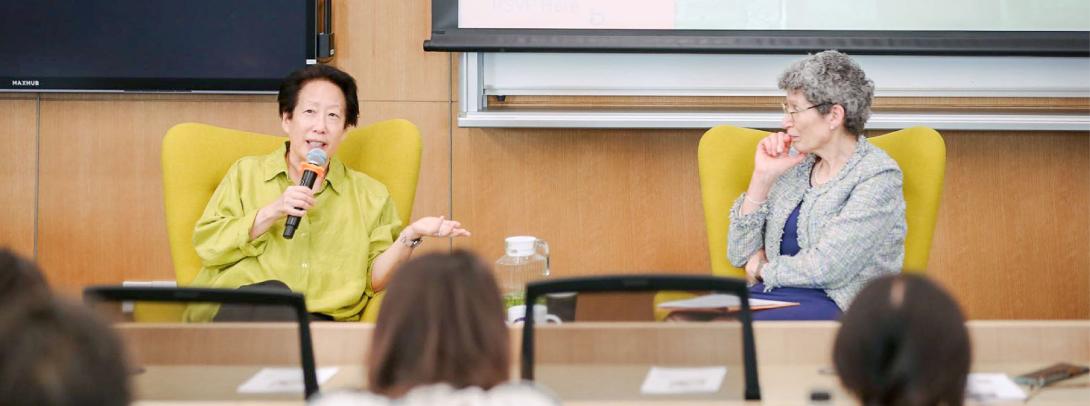Memoir-writing, mother-daughter relationships, and ancestral discoveries were at the heart of the conversation between award-winning American writer Gish Jen and Provost Joanna Waley-Cohen at the Conversation with the Provost dialogue, held April 23 on campus.
“It was just this huge thing in front of me—either I was going to have to deal with it, or I was going to have to quit,” said Jen when asked about writing her autobiographical novel Bad Bad Girl, to be published next year by Knopf.
She joked about waiting to publish 10 books (and turning 68) before finally acting on the impulse many authors have to write about their mothers. “In this case, my mother died during COVID, and I just was so overwhelmed with all of the feelings that came with that, that I kind of had to write this book.”
Jen, a member of the American Academy of Arts and Sciences, taught a J-term course in 2015 about culture, the arts, and identity. Since then, she has returned to NYU Shanghai several times to teach creative writing, and is currently teaching Introduction to Fiction Writing.
Jen told the audience that she encourages her students to pursue the urgency of writing. “Listen to me!,” she said, quoting a line from Samuel Taylor Coleridge’s poem “The Rime of the Ancient Mariner.” “I don't write anything unless I feel like I would rise up out of my death bed to finish it,” she added. “If you don't have that feeling yourself, I feel you shouldn't sit down to write your book.”
To bring truth to her own memoir meant travel, exploration, and plenty of research. “I really, really, really prefer fiction; I think nonfiction is a lot of work,” Jen laughed. She talked about venturing to the watertown of Wuzhen, where she learned that her grandfather had been a local school headmaster and discovered the writer Mao Dun (who later immortalized her grandfather as a character in his writing). To step into her mother’s lived experiences, she mapped out and visited key locations in Shanghai, pinpointing exactly where in the city her mother used to live.
Waley-Cohen spoke about learning about her mother’s experiences in London during World War II through a collection of recently published letters from her mother’s best friend. “I think the moral of the story is that the story is never over,” she said. “You keep learning more, and you keep understanding more as the pieces of the puzzle fit in with one another.”
Jen said she’s glad she waited until now to write this novel. “I think the impulse for younger writers, especially if you’ve had a difficult mother, is to condemn her,” she said. Her own experience of motherhood has given Jen insight into the complexities of mother-daughter relationships, while having more access to Shanghai has helped the story of her mother’s life there take shape. “I have much more sympathy for her than I would have had when I was younger,” she said.
After sharing a fictitious conversation between her late mother and herself in an excerpt from Bad Bad Girl, Jen said her “fiction self and nonfiction self” exist side by side. “The difference between fiction and nonfiction is that with nonfiction, you can be completely awake,” she said. “With fiction, you have to be a little bit asleep; it’s coming up through your subconscious. If you are completely awake, it will not come.”
—
Gish Jen has been published in The New Yorker, The Atlantic, the New Republic, and The Paris Review. She has been included in five volumes of The Best American Short Stories—not to mention The Best American Short Stories of the Century, edited by John Updike. Her novels are Typical American, Mona in the Promised Land, Who's Irish?, The Love Wife, World and Town, Tiger Writing: Art, Culture, and the Interdependent Self, The Girl at the Baggage Claim: Explaining the East-West Culture Gap, The Resisters: A Novel, and Thank You, Mr. Nixon: Stories.
More about Gish Jen:
Writing Across Cultures with Gish Jen
Course Spotlight: Telling Stories with Gish Jen


